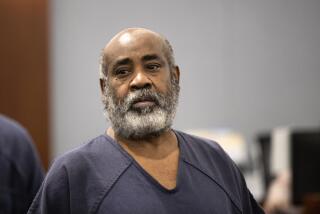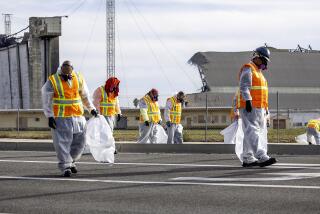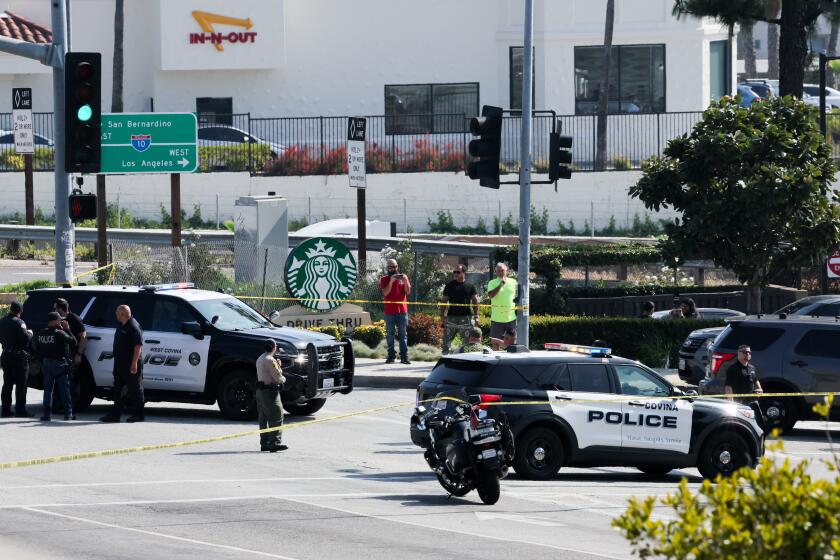Ghost Ship operator’s arraignment in deadly fire delayed in Oakland
A judge Thursday delayed until next week the arraignment of the operator of an Oakland warehouse where three dozen people died in a devastating fire so that the second defendant can be brought to court as well.
The continuance is bound to be the first of many delays in what promises to be a complex and difficult criminal trial.
Derick Almena and partner Max Harris are charged with 36 counts of involuntary manslaughter — one count for each of the people who died in the fire that broke out on the night of Dec. 2, 2016, in the cluttered warehouse that had been converted into a residence and concert venue known as the Ghost Ship.
Relatives of some of the victims sat silently through an hour of courtroom delays Thursday before Alameda County Superior Court Judge Thomas Nixon agreed to a defense motion to hold over Almena’s arraignment until June 15 so that Harris, now jailed in Los Angeles County, can be transferred north to face the same charges. Attorney Jeffrey Krasnoff told the judge he would probably seek to delay pretrial and bail hearings another 30 days after that.
Almena appeared silently behind a glass partition, not visible to many of those in the courtroom. After the brief motion hearing, Krasnoff stepped outside the courtroom to make a short statement to a bank of waiting television cameras. He called the criminal case “a distraction” from the responsibility that public agencies face for not also addressing fire safety hazards in the community.
Victims’ family members filed silently out a side door of the courtroom. On the sidewalk outside, the father of one victim told reporters he attended the hearing to see if Almena showed “remorse.”
”I just wanted to see his face,” said David Gregory, the father of Michela Gregory, who died with her boyfriend in the fire.
The squat two-story warehouse in Oakland’s Fruitvale district that Almena dubbed the Ghost Ship operated as a rogue art collective and underground venue for music performances, and an illegal home for some dozen itinerant tenants.
Thirty-six people died inside on Dec. 2 when a fire started during a band performance, the worst fire fatality in the nation in more than a decade. No cause has been determined, but former tenants and firefighters described do-it-yourself wiring and an internal maze of structures and junk and haphazard wood stairs that invited fire and would have made escape difficult.
Oakland prosecutors allege Almena and Harris, a tattoo artist and musician who allegedly helped Almena operate the Ghost Ship, made the danger all the worse by closing off a standard back staircase the night of the fire.
Almena and his wife moved their family for the night to the quiet of a local motel. They had recently regained custody of their three children after complaints the warehouse created an unhealthy environment, including an erotic New Year’s party after which condoms were found.
Almena, 47, sought refuge from the public outrage over the fire in the nearby Lake County community of Upper Lake. The East Bay Times quoted neighbors as saying Almena, who often freelanced as a set builder, had begun to collect odd pieces of furniture on his rented porch and yard, as well as making alterations to the fence.
Harris, 27, who moved to Los Angeles after the fire to continue to produce electronic music, is charged with the same 36 counts of involuntary manslaughter. He was arrested in Los Angeles and taken to the county jail, where he awaits transfer to Oakland for his own arraignment.
Both men are being held on $1.08 million bail.
Almena also is represented by one of California’s most flamboyant criminal defense attorneys, Tony Serra, whose client roster also included San Francisco Chinatown’s convicted racketeer Raymond “Shrimp Boy” Chow. Serra has summoned press to his offices Friday to lay out Almena’s defense, and promised an appearance of Almena’s wife, Micah Allison.
Legal experts disagree over whether the lack of a determination of what caused the fire will hamper the criminal case. Oakland prosecutors contend it is enough to show Almena and Harris willfully created conditions that invited such disaster, even complaining to the building owner of overloaded electric circuits.
The building owner, Chor Ng, has not been charged in the case. Other tenants of the building have told The Times that the power system was faulty, sometimes causing light fixtures to burst in a shower of sparks.
Lawyers representing families of the fire victims allege in civil lawsuits that Oakland is complicit in the deaths, a viewpoint Almena’s defense team shares.
City inspection records reviewed by The Times show Oakland inspectors repeatedly cited the owner of the Ghost Ship for sidewalk clutter and graffiti but failed to address its use as a club or dwelling.
Those files show the city inspectors similarly turned a blind eye to other illegal warehouse conversions, some for decades, and acted only after events forced safety hazards into public view.
Inspectors frequently cited building owners for blight violations — graffiti on walls and fences, tall weeds, or piles of trash. They returned often to ensure those exterior nuisances were corrected and if not, levied liens against building owners to collect inspection fees. But even when the city received reports of illegal warehouse conversions, cases routinely were closed without action because inspectors did not gain physical entry inside the buildings.
For updates and more, follow @paigestjohn.
UPDATES:
11:05 a.m.: This article was updated with the arraignment being delayed until next week.
This article was originally published at 8:35 a.m.
More to Read
Start your day right
Sign up for Essential California for news, features and recommendations from the L.A. Times and beyond in your inbox six days a week.
You may occasionally receive promotional content from the Los Angeles Times.







